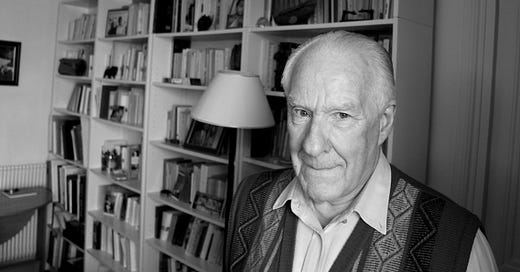Badiou and the Dharma
What a Marxist philosopher can teach us about Buddhist practice—and vice versa
Alain Badiou, the French philosopher known for fusing mathematics with metaphysics and Marxism with Plato, may seem like an unlikely companion for a Buddhist conversation. And yet, once you step beyond the jargon, his thought reveals surprising affinities with the insights of Buddhist teachers—from Zen masters like Linji to modern voices like Thich Nhat Hanh and Joanna Macy.
This post is an attempt to draw a line (a crooked one) between Badiou’s theory of the event and the Buddhist path of awakening. It’s also a meditation on truth, practice, and how we stay faithful to something beyond ourselves.
1. The Event and the Flash of Awakening
At the heart of Badiou’s philosophy lies the concept of the event: a rupture in the fabric of reality, something new and unthinkable that shatters the known order. Falling in love, the birth of a political movement, a scientific breakthrough—these are events. They are not just happenings. They change what it means to live.
Sounds a bit like kenshō, doesn’t it?
In Zen, awakening often comes in flashes—a shout, a paradoxical kōan, a slap from a teacher—and breaks through the structures of ordinary thinking. The old self is suspended. A new view becomes possible. The subject is no longer the same.
In Dzogchen and Chan, this moment is called “recognition of the nature of mind” or simply “seeing.” It’s an event, not a process.
But here’s where both Badiou and the Buddhists agree: the real work starts after the event.
2. Fidelity and the Post-Awakening Path
For Badiou, truth is not given once and for all in the event. Instead, it unfolds in a process called fidelity, an active commitment to live out the consequences of the event, often in difficult or uncertain terrain.
Similarly, in Buddhism, awakening is not a full stop. In fact, most teachers from Theravāda to Mahāyāna emphasize the importance of sustained practice after insight. Meditation, ethical conduct, and compassionate engagement are not decorations but vehicles for living the truth.
Truth, in both systems, is not just discovered. It is enacted.
3. Ethics of the Event vs. Ethics of Compassion
Badiou famously critiques conventional ethics (think “human rights discourse”) for being reactive and managerial. Instead, he proposes an ethics of fidelity to the event. If a political uprising occurs, what matters ethically is not legality or consensus—but whether you are willing to stay true to its promise.
Contrast that with Buddhist ethics, often grounded in non-harming (ahiṃsā), compassion (karuṇā), and the noble eightfold path.
And yet, many modern Buddhist teachers like Joanna Macy or Bhikkhu Bodhi argue for radical responsibility in the face of planetary and systemic suffering. This too is fidelity: not to an abstract doctrine, but to the truth of interbeing and the reality of suffering.
Keep reading with a 7-day free trial
Subscribe to The Gentle Law to keep reading this post and get 7 days of free access to the full post archives.





